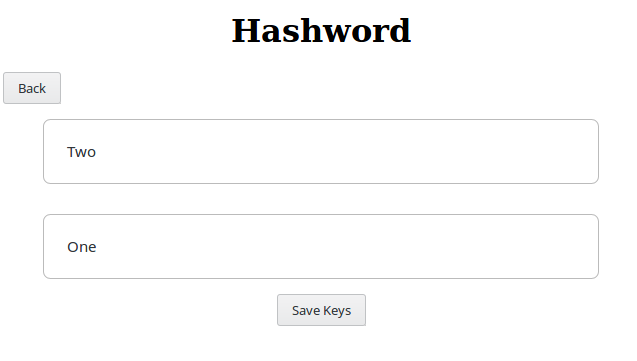A password manager that allows you to only remember one 'master' password that is combined with a keyword and hashed for a unique password.
For example you can use the Password Key for example Service with your one password to remember mylongandsupersecretpassword to get a password to use bc4f96f753fdaf8b0f6c1c24ee7ba27cd0f4e1cdd4b1ca3e6407db7fec9c7b3f when you log into the service.
# macOS
open index.html
# Linux
xdg-open index.html
# or
firefox index.htmlThe Password Key and the Master Password are combined (concatenated) and hashed using SHA256. A '!' is added to the beginning to fulfil the special character requirement of some websites. Then the first letter is capitalized to fulfill the need to have both uppercase and lowercase characters.
- One password to remember
- Unique secure (long) passwords for each site/service
- Have to be careful where you paste after you enter the password. You could consciously copy some text after you login.
- If your computer is compromised a portion of your passwords are known (the Password Keys). Even if a Password Key is known the resulting password must be verified with the site/service which has additional security such as rate limiting. One solution would be to require the master password initially and pre-populate the field so you just select the Password Key. However verifying the master password requires storing a hash of the Master Password which can be used to brute force the Master Password.
Why do you create a gibberish password? What about this xkcd comic?
The main problem is using the same password in multiple places. If a site database is compromised or a website does not hash your password then your password is known. If your email and username are also the same for multiple sites and services then they are compromised as well. Hashword allows you to remember one password but have long unique passwords with the required criteria (uppercase and lowercase characters and special characters). If a website stores your password in plaintext you will still need to find the input used to create that hash in order to get your Master Password.
If someone knows you are using Hashword they could try a common passwords as Master Password and common Password Keys such as the website name. Don't use a common or short password as the Master Password. An important principle of security is not to give people information. Even letting someone hear you type your password is information.
If you don't know your Password Key but have access to your email you should reset your password. If you remember your Password Key you can manually generate your password with the SHA256 hash function. An app for Android that I recommend is Hash Droid. You need to select SHA256 and enter your Password Key and Master Password without a space in between them. Then add a '!' to the beginning of the result and capitalize the first letter of the result.
Why not come up with a random password for each Password Key and require the Password Master to view them?
This would also require a central database to store the random passwords for each site in order to be accessible from multiple devices, which could become compromised.
The best way is to use the web version in Dropbox or a similar service. If you are using native versions to be able to quickly add the password to the clipboard you will need to manually add the Password Keys.
Change the Password Key used for that site, and use the new generated password for that site.
The problem is that not all sites support two factor authentication. If someone knows your password you can still be a victim of phishing and they can get your two factor authentication code. You login to a fake site and they use your password on the real site which triggers a two factor authentication code sent to you. You enter the code into the fake site and the attacker enters it in the real site. It is still important to use a different password for each service.
If your password is stored in plaintext or a website does not use TLS. You could add random characters to all of your Password Keys for additional security if your Master Password is known.


